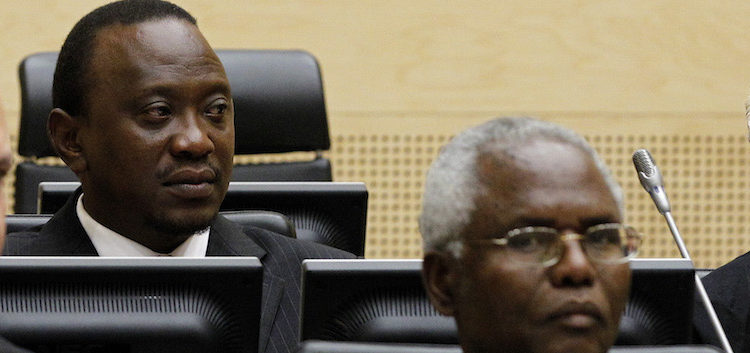By Susan Kendi and Kwamchetsi Makokha
A trove of 20 documents published on the International Criminal Court’s website offers a rare peek into frantic efforts to protect 12 witnesses who would testify against Uhuru Kenyatta and Francis Muthaura.
Prosecutors fearing for the safety of the 12 witnesses had repeatedly applied for the court’s permission to hold back the names and identities of five witnesses from the accused’s lawyers until a month to the opening of the trial. They followed that with a request to withhold information in the statements of another seven witnesses from lawyers. A third application sought to hide the names of investigators interviewing witnesses.
In a public redacted version of the judges’ decisions, first published on February 3, 2017, Trial Chamber V(b) judges Kuniko Ozaki (presiding), Robert Fremr and Judge Geoffrey Henderson disclose how the prosecution was allowed to hold back from disclosing the identity of the witnesses to Kenyatta and Muthaura’s lawyers until the Victims and Witnesses Unit had put into place adequate protective measures.
Following the VWU’S report, the judges ruled that there was no point in continuing to withhold the identity of Witness P-232 from the defence lawyers beyond February 11, 2013 – a month before Kenyatta was elected as President of Kenya.
The applications and the decisions of the judges have remained unknown since they were confidential, with only the ICC’s Victims and Witnesses Unit being notified in one instance.
Prosecutors had argued that the nature of the four witnesses’ evidence was “unique” and had substantial incriminatory value, and that there was some “powerful incentive” to interfere with these witnesses.
Secondly, it was feared that there might be a risk of witness tampering. The prosecution alleged that during the Pre-Trial stage of the case, intermediaries allegedly acting on behalf of Kenyatta targeted witnesses exhorting them to rescind their testimony and decline to testify.
Prosecutors also said that shortly after the confidential disclosure of the identities of Witness 11 and 12 to Kenyatta and Muthaura’s lawyers, witnesses were contacted and offered a deal not to testify.
Defence lawyers opposed the requests and wanted all witnesses and their statements revealed. They argued that the delayed disclosure of possibly 12 out of 35 prosecution witnesses was unmanageable and unreasonable. For good measure, Muthaura’s lawyers also applied to have one of their witness placed under the ICC’s protection programme.
Prosecutors alleged that three of the insider witnesses whose names had already been disclosed confidentially to the Defence had been interfered with in. During the pre-trial stage [a witness] “was the target of a pre-disclosure bribery campaign by intermediaries purportedly acting on behalf of the Accused, which aimed to persuade the witness to withdraw his testimony regarding the PEV and to agree not to testify for the Prosecution.”
The Prosecution also claimed that a number of leaks of confidential information have occurred in this case so far. They argued that disclosing the redacted transcripts would provide Kenyatta and Muthaura’s lawyers with enormous information of the witnesses’ accounts.
ICC Prosecutor Fatou Bensouda withdrew charges against Muthaura in March 2013, and was forced to make a similar withdrawal of charges against Kenyatta in December 2014 after failing to muster sufficient evidence to proceed to trial following a spate of witness withdrawals and recantations.







